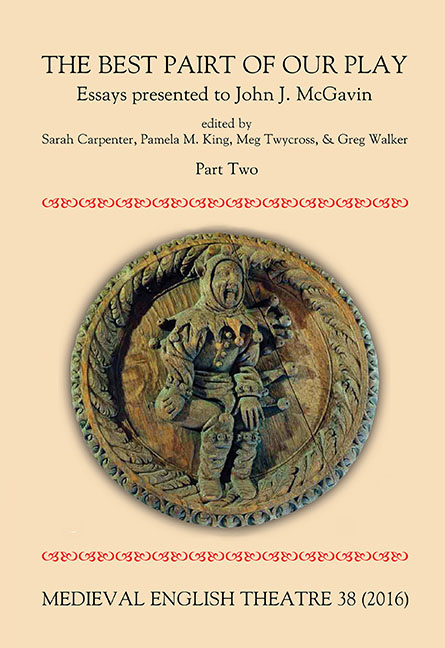 Medieval English Theatre 38
Medieval English Theatre 38 Published online by Cambridge University Press: 20 April 2017
Théodore de Bèze wrote Abraham Sacrifiant in 1550 at the request of the authorities of the University of Lausanne for his students to present at the Presentation Day. He had been appointed Professor of Greek there after his arrival in Geneva in 1548. In 1575 it was translated into English by Arthur Golding, a writer who was already well known and highly regarded for his translations of classical texts, in particular of Ovid's Metamorphoses, but, as a Puritan, he was also interested in and translated the work of earlier Puritan writers like Calvin and de Bèze. His translation of de Bèze's play was published in 1577 by Thomas Vautroullier in Blackfriars, London. Surprisingly, perhaps, given the popularity of de Bèze's play in France, the English translation attracted little interest in England and we have no record of a performance.
In his letter ‘To the Reader’ dated ‘From Lausan the first of October 1550’, which precedes the Prologue, de Bèze begins by reflecting on
two thinges that comforted me maruelously. The one is the infinite number of promises vttered by the mouth of him which is the truth it selfe, whose sayinges are alwayes matched with effect. The other is the multitude of examples, whereof euen the least are able enough, not only to encourage and harten the weakest & faintest harted in the worlde, but also to make them inuincible.
3: 8–4: 41He lists the three men he regards as God's ‘greatest wonders’, the first of whom is Abraham. He then goes on to regret his waste of the talent for poetry which God gave him in his imitations of other writers and cutting epigrams which hurt both ways. On his conversion he resolved to reorientate his life by translating holy books, especially the Psalms — both a penance and a devotion. Of more interest perhaps to us today are his following comments on form and style, first on the genre of what he has written about Abraham and Isaac, where he concludes that it is equally balanced between comedy and tragedy:
But to come to the matter that I haue in hand, it is partly tragical and partly comicall: & therefore I haue separated the prologue, & diuided the whole into pawses, after the maner of actes in comedies, howbeit without binding of my self therto.
7: 13–21To save this book to your Kindle, first ensure [email protected] is added to your Approved Personal Document E-mail List under your Personal Document Settings on the Manage Your Content and Devices page of your Amazon account. Then enter the ‘name’ part of your Kindle email address below. Find out more about saving to your Kindle.
Note you can select to save to either the @free.kindle.com or @kindle.com variations. ‘@free.kindle.com’ emails are free but can only be saved to your device when it is connected to wi-fi. ‘@kindle.com’ emails can be delivered even when you are not connected to wi-fi, but note that service fees apply.
Find out more about the Kindle Personal Document Service.
To save content items to your account, please confirm that you agree to abide by our usage policies. If this is the first time you use this feature, you will be asked to authorise Cambridge Core to connect with your account. Find out more about saving content to Dropbox.
To save content items to your account, please confirm that you agree to abide by our usage policies. If this is the first time you use this feature, you will be asked to authorise Cambridge Core to connect with your account. Find out more about saving content to Google Drive.